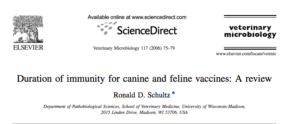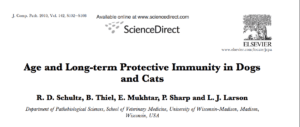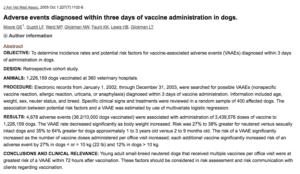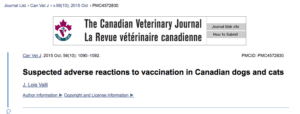PET VACCINE REQUIREMENTS IN WA
RABIES
In Washington State, rabies is the only vaccine required for dogs and cats. At the state level, this requirement exists as a WAC which you can read more about here: https://www.doh.wa.gov/YouandYourFamily/IllnessandDisease/Rabies/PetVaccinationRequirement
Most cities or counties also have codes stating rabies vaccines are required. Often, and in the case with the state requirement, the rules state pets should be re-vaccinated every 1-3 years, or as instructed by the vaccine manufacturer. The rules do not allow for a positive antibody titer to be shown and meet vaccine requirements, but we are hopeful that will soon change.
OTHER VACCINES
Other vaccines for dogs and cats may be required by groomers, daycares, or boarding facilities. These vaccines include Distemper/Parvo (DP, DHPP, or DAPP) and Bordetella for dogs, and FVRCP for cats. The businesses requiring these vaccines are able to make their own rules about which vaccines they may require, on what interval, and whether or not they will accept a letter of exemption or waiver from a veterinarian. Some kennels have insurance policies that dictate their vaccine requirements due to the nature of their business.
DENIAL OF CARE
A growing trend is some veterinarians refusing care or denying prescription refills if pets are not “up to date” on vaccines. There is no law in Washington that binds veterinarians to enforce rabies requirements, compliance is ultimately the pet owner’s decision. Refusal of care can go against the vaccine manufacturer’s own instructions, as they typically state only healthy animals receive vaccinations. A veterinarian should not be trying to coerce a client to accept vaccinations for their pet when they are seeking care during illness, nor should needed medications be withheld to get pet owners to comply.
WHAT ABOUT EXEMPTIONS OR WAIVERS?
Your veterinarian may be willing to write a letter of exemption or a waiver for your pet’s vaccinations, either for medical reasons or for certain vaccines not being recommended. Even though rabies is an absolute requirement, AAHA (American Animal Hospital Association) does state that veterinarians could exempt pets for rabies vaccine only if there are true medical reasons for exemption, and that the pet should be an already established patient of the veterinarian exempting them. This would still potentially put a pet owner out of compliance, however, and whether this waiver would meet requirements would depend on the state and situation. You can read more about this here: https://www.aaha.org/guidelines/canine_vaccination_guidelines/faq_rabies_vaccination.aspx
VETERINARY VACCINE INGREDIENTS
Veterinary vaccines are regulated by APHIS (Animal and Plant Health Inspection Service) an agency within the USDA, whereas human vaccines are regulated by the FDA. It can be near impossible to get full list of veterinary vaccine excipients, as the manufacturers are not required to disclose them. Instead, they can claim the ingredients are “proprietary” and only offer information about a few excipients. For example, many rabies vaccines use aluminum hydroxide as the adjuvant, but the manufacturer will not disclose the amount per dose. Veterinary vaccine ingredients are very similar to the ingredients in human vaccines and may include; Aluminum, thimerosol, antibiotics, animal products including cell lines and blood products, retroviruses and contaminants.
Manufacturer package inserts are also much smaller for veterinary vaccines and lacking much of the information found in human vaccine package inserts. Here is a comparison of the Defensor 1 rabies vaccine product insert from Zoetis vs the Imovax Rabies human vaccine package insert from Sanofi Pasteur
Defensor 1 rabies vaccine product insert
Imovax Rabies human vaccine package insert from Sanofi Pasteur
ADVERSE EVENTS AND REPORTING
Possible adverse effects of veterinary vaccines goes beyond the listed precautions in their product inserts. The USDA considers a vaccine adverse event to be any undesirable side effect or unintended effect (including lack of desired result) associated with administration of a vaccine. AAHA has a listed table of adverse events which you can see here: https://www.aaha.org/guidelines/canine_vaccination_guidelines/vaccine_adverse_reactions.aspx
Information from the 2009 Annual Conference of the AHVMA (American Holistic Veterinary Medical Assosciation) references two studies, which looked at adverse events in 1.25 million dogs and 0.5 million cats. They found 38 adverse events per 10,000 dogs vaccinated, and 51.6 adverse events per 10,000 in cats vaccinated. Risk factors for both included young adult age, neutering, multiple vaccines given at once, and for dogs also included small breed size. The AHVMA stated these are risks which should be communicated to pet owners. Here are those studies: https://avmajournals.avma.org/doi/10.2460/javma.2005.227.1102 https://avmajournals.avma.org/doi/full/10.2460/javma.231.1.94
Vaccine adverse events can be reported by veterinarians or their staff, as well as pet owners. Reactions should be reported to both APHIS and the vaccine manufacturer. The APHIS portal for reporting can be found here: https://www.aphis.usda.gov/aphis/ourfocus/animalhealth/veterinary-biologics/adverse-event-reporting/ct_vb_adverse_event





